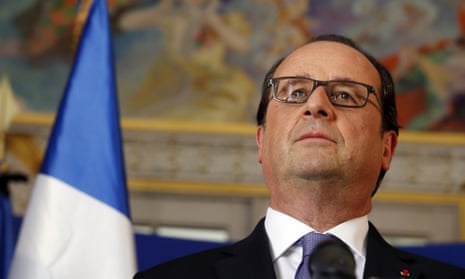Hours before the truck attack that killed 84 people on the Nice seafront on Thursday, the French president, François Hollande, addressed the nation from a gilded room in the Élysée palace in his traditional Bastille Day television interview.
“Being president of the republic means being confronted with death, being confronted with tragedy and drama,” he reflected, unaware of the tragedy to follow that night.
Now the president is under pressure to explain to an exasperated and grieving society how he proposes to handle what his prime minister has called a new reality for France, in which terrorism is “part of our daily lives” and further attacks are inevitable.
The Nice rampage was the third major terrorist attack on France in 18 months. More than 230 people have been killed in attacks claimed by jihadis in France since the start of 2015, meaning Hollande’s presidency has now seen more bloodshed on French soil than any since the Algerian war.
Once, there would have been a brief window of political unity and truce during such a grim moment of national mourning. After the attacks last year on Charlie Hebdo magazine and a kosher supermarket, and then the coordinated attacks on a stadium, bars and a rock gig in Paris, there was a short pause in political sparring. But this time the anger and accusations began even before families could bury their dead.
With presidential and parliamentary elections less than a year away, French opposition politicians have questioned what they described as security failings that made it possible for the heavy truck to career a mile through large crowds before it was finally halted.
“Fatalism isn’t a policy,” said Alain Juppé, a leading contender in the rightwing opposition’s primary race, in response to the Socialist government’s warning of an ever-present terrorist threat. Marine Le Pen, the leader of the far-right Front National who all polls suggest will get through to the final round of the 2017 presidential race, criticised what she saw as the inaction of the whole political class – both on the left and right – and called for the interior minister to resign.
“Even if it is a time for mourning and compassion, one feels clearly that the country is headed for a time of questioning its political leadership,” wrote Yann Marec in the Midi Libre daily.
In the aftermath of last January and November’s terrorist attacks, Hollande’s popularity ratings climbed slightly before dropping back down, and they remain the lowest ever for a modern leader in France. This time it is unclear how Hollande will be viewed. Frederic Dabi, of the polling firm IFOP, said there were questions as to whether “public opinion, after a third large-scale attack … will say: ‘This government can’t protect us.’”
An Ifop poll for Le Figaro, the first since the Nice attack, found 67% of respondents did not have confidence in Hollande and the government to fight the terrorism threat.
The week ahead is crucial for Hollande as the government prepares its response. Hollande had already declared that France was “at war” following November’s Paris attacks, which investigators believe were planned by Islamic State from Syria and Iraq. France is the second biggest contributor to US-led airstrikes against Isis. After the Nice attack, Hollande said he would step up airstrikes further. His defence minister will travel to Washington this week to discuss this.
Hollande has vowed to extend France’s state of emergency, which has already been in place for eight months. Opposition politicians on the right expressed anger that the state of emergency – which allows for restrictions on large outdoor gatherings – had not prevented further attacks.
After the Charlie Hebdo attacks, the tone of the government’s approach was to try to understand society’s ills and act on what was termed France’s “social and ethnic apartheid”. After November’s attacks, the tone was more martial.
This time Hollande is pleading for the preservation of national cohesion and unity. He and his government insist that the priority now is that the country is not fractured or divided. The message from within the Élysée is that rational action, not emotion, must drive the political response.
The prime minister, Manuel Valls, in his first long interview after the attack, warned against what he deemed divisive Donald Trump-style proposals such as restricting Muslims’ entry to the US. He told Le Journal du Dimanche: “The response to Islamic State cannot be the Trump-isation of our state of mind.”
